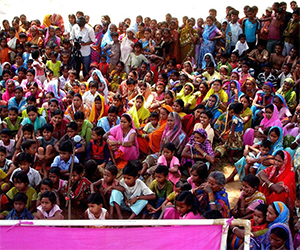With the goal of increasing demand for reproductive health services, several troupes of actors took to the far-reaching tribal regions of Jharkhand in central India in April and May 2011 with a play about family planning.
The state-recruited troupes performed a street play that was developed by the USAID-funded Innovations in Family Planning Services Technical Assistance Project (ITAP). The troupes were trained by the Darpana Academy of Performing Arts and performed over 150 shows in three districts of Jharkhand. Each performance drew an audience of over 300 men, women and children.
Using an entertainment-education approach, this ITAP initiative employed communication techniques – coupling the play with puppets, local folk tunes, themes and background effects – to improve attitudes towards family planning and improve contraceptive adpotion.
The street play compared two families: one with only one child and the other with many children. In so doing, it addressed several family planning/reproductive health topics, including the ideal age of marriage for girls, delaying the first child, the benefits of spacing children three years apart and limiting family size to two children. The play examined the health, economic, quality of life and relationship consequences that resulted from the family planning decisions made by each family.
Audiences could not help but compare their own lives to the reality that unfolded before them through the play. The key messages of the performance were reinforced through post-performance discussions and exit interviews.
Follow up interviews conducted by community-level health workers showed that male and female audience members found the play credible and highly relevant. Furthermore, most attendees remembered many of the important themes of the street play. Some of the take-away messages included:
- Benefit of having a small family;
- Using contraceptive methods for family planning (Copper T, condoms and sterilization methods were the more memorable methods);
- Importance of spacing children three years apart;
- Ideal age of marriage for girls should be at least 18.
It is clear that this street performance offered the right combination of entertainment and education.
The Innovations in Family Planning Services Technical Assistance Project (ITAP) is a six-year USAID-funded project led by the Futures Group that addresses reproductive and child health activities at the national level and in three states in northern India (Uttar Pradesh, Uttarakhand and Jharkhand).
View more photos of the street performance.
//


